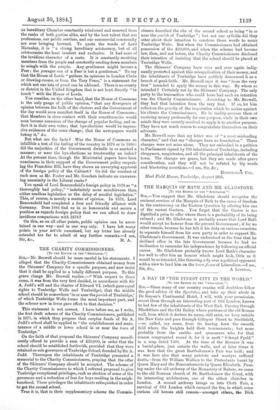THE CHARITY COMMISSIONERS.
[TO THE EDITOR OF THE "SPECTATOR."] SIR,—Mr. Browell should be more careful in his statements. I alleged that the Charity Commissioners obtained money from the Skinners' Company for a specific purpose, and now insist that it shall be applied to a totally different purpose. To this grave charge Mr. Browell replies :—" With respect to these sums, it was from the very first decided, in accordance with Sir A. Judd's will and the charter of Edward VI. (which gave equal rights to Tunbridge Wells and Tunbridge), that the middle school should be somewhere 'in or near the pariah of Tunbridge,' of which Tunbridge Wells forms the most important part, and the scheme now in force gave effect to that decision."
This statement is not correct. I have before me, as I write, the first draft scheme of the Charity Commissioners, published in 1875, in which they propose that surplus funds of Sir A. Judd's school shall be applied to " the establishment and main- tenance of a middle or lower school in or near the town of Tunbridge."
On the faith of that proposal the Skinners' Company munifi- cently offered to provide a sum of £20,000, in order that the school should be established forthwith, provided that they were retained as sole governors of Tunbridge School, founded by Sir A. Judd. Thereupon the inhabitants of Tunbridge presented a memorial to the Charity Commissioners, praying that the offer of the Skinners' Company should be accepted. The scheme of the Charity Commissioners to which I referred proposed to give Tunbridge exceptional privileges, such as election of some of the governors and a reduction of fees for boys residing in the neigh- bourhood. These privileges the inhabitants relinquished in order to get the second school.
True it is, that in their supplementary scheme the Commis- sioners described the site of the second school as being "in or near the parish of Tunbridge " ; but not one syllable did they utter about their intention to construe those words to mean Tunbridge Wells. But when the Commissioners had obtained possession of the £20,000, and when the scheme had become law, then, and not before, the Charity Commissioners disclosed their intention of insisting that the school should be placed at Tunbridge Wells.
The Skinners' Company have over and over again indig- nantly protested against this misapplication of their money, and the inhabitants of Tunbridge have publicly denounced it as a breach of good-faith. Mr. Browell says it was " from the very first" intended to apply the money in this way. By whom so intended ? Certainly not by the Skinners' Company. The only party to the transaction who could have had such an intention was the Charity Commissioners. According to Mr. Browell, they had that intention from the very first. If so, let him reflect on the gravity of the imputation which he makes against his clients the Commissioners. He in reality accuses them of receiving money professedly for one purpose, while in their own minds they were secretly resolved to apply it to another purpose. They have not much reason to congratulate themselves on their advocate.
Mr. Browell says that my letter was of " a most misleading character," and that my " charges have no foundation." These charges were not mine alone. They are embodied in a petition to Parliament signed by 700 inhabitants of Tunbridge, including clergymen, magistrates, and all the principal inhabitants of the town. The charges are grave, but they are made after grave consideration, and they will not be refuted by big words and blustering assertions.—I am, Sir, &c.,
HoltEasuallt Cox.
Marl Field House, Tunbridge, August 28th.


































 Previous page
Previous page